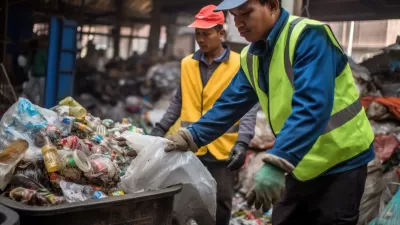While cities in the developing world embrace the chaos and risk inherent in their informal landscapes, the Western world excels at regulation. But this dynamic is starting to change, to the dismay of incumbent industries and establishment regulators.
Over the last two decades, the social web has helped facilitate the "de-formalization of every sector of the economy and society [in the developed world], from transportation, to wellness and healthcare, to travel, to journalism, to humanitarian aid, and on and on and on," argues Nick Grossman, “Activist in Residence” at Union Square Ventures and a Visiting Scholar at the Center for Civic Media at the MIT Media Lab. "In effect, [these platforms] are applying highly formal structures to these 'informal' personal interactions, bridging the gap between the industrial economy and the informal economy."
"Not surprisingly, we’re seeing this conflict unfold as the new informal economy, operating at web scale, draws the ire of both incumbent industries and establishment regulators whose livelihoods it threatens," he explains. "Sharing rides is illegal. Sharing apartments is illegal. Making person-to-person loans is illegal. Even free online education is illegal. For now."
One might draw parallels with the tactical urbanism movement, and the pushback from local authorities that several projects have received.
"Slowly but surely, however, jurisdictions are adapting their regulatory positions to recognize and support the new informal economy, powered by the tools of the social web, and recognizing some of the legal precedents that have allowed the web to thrive," Grossman adds. "The challenge will be to continue pursuing the goals of safety, accountability and equity, while simultaneously embracing this return to the informal."
FULL STORY: How the Social Web is Helping the West Rediscover Its Informal Side

Study: Maui’s Plan to Convert Vacation Rentals to Long-Term Housing Could Cause Nearly $1 Billion Economic Loss
The plan would reduce visitor accommodation by 25,% resulting in 1,900 jobs lost.

North Texas Transit Leaders Tout Benefits of TOD for Growing Region
At a summit focused on transit-oriented development, policymakers discussed how North Texas’ expanded light rail system can serve as a tool for economic growth.

Why Should We Subsidize Public Transportation?
Many public transit agencies face financial stress due to rising costs, declining fare revenue, and declining subsidies. Transit advocates must provide a strong business case for increasing public transit funding.

How Community Science Connects People, Parks, and Biodiversity
Community science engages people of all backgrounds in documenting local biodiversity, strengthening connections to nature, and contributing to global efforts like the City Nature Challenge to build a more inclusive and resilient future.

Alabama: Trump Terminates Settlements for Black Communities Harmed By Raw Sewage
Trump deemed the landmark civil rights agreement “illegal DEI and environmental justice policy.”

Dear Tesla Driver: “It’s not You, It’s Him.”
Amidst a booming bumper sticker industry, one writer offers solace to those asking, “Does this car make me look fascist?”
Urban Design for Planners 1: Software Tools
This six-course series explores essential urban design concepts using open source software and equips planners with the tools they need to participate fully in the urban design process.
Planning for Universal Design
Learn the tools for implementing Universal Design in planning regulations.
City of Santa Clarita
Ascent Environmental
Institute for Housing and Urban Development Studies (IHS)
City of Grandview
Harvard GSD Executive Education
Toledo-Lucas County Plan Commissions
Salt Lake City
NYU Wagner Graduate School of Public Service





























